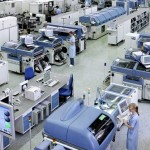 Recently I explored some of the ways mobile innovation is changing how our factories operate, with a growing range of services providing both analytical capabilities but also the ability to control machines remotely.
Recently I explored some of the ways mobile innovation is changing how our factories operate, with a growing range of services providing both analytical capabilities but also the ability to control machines remotely.
It’s hard to dispute that there are a huge number of changes and innovations hitting the sector, with many of these chronicled in the recent State of Manufacturing Technology report published by Plex Systems.
Plex surveyed over 130 manufacturers on the kind of technology they’re making use of today, and the technology they hope to utilize in the near future.
Security and the cloud
Despite certain fears spread in the media about cloud based systems, the vast majority of those surveyed said they had no issues at all, with many even saying that security had improved since moving to the cloud.
“When we first started out with cloud, about 15 years ago, that was a very real concern among some of our potential customers,” Plex say. “What we’ve seen over the years is that that concern has curbed significantly. … It’s a point I make often: Just because your data is in your data center doesn’t make it secure.”
Mobile on the shop floor
As highlighted in the previous post, mobile devices were commonplace throughout the factory, with nearly all respondents saying they used tablet devices in their operations.
Interestingly, the majority of respondents said that they were quite happy using regular consumer devices rather than anything specific to manufacturing or their particular industry.
“They’re ubiquitous, they’re cost-effective, they’re basically a terminal in everyone’s pocket. Why wouldn’t we go that route?” the authors say. “You still have the question, ‘How do I secure that? How do I secure the data?’ But you have that with any technology. It’s just a different way of looking at it.”
There is considerably less enthusiasm for technologies such as Google Glass however, with few of the impression that they will prove useful in the coming years.
What does appear clear however is that the humble PC is gradually vanishing from the shop floor, with computers increasingly available in every device.
Changing skill set
The report also highlighted the changing skills required in the modern factory, with data analysis coming up above more traditional skills such as mechanical engineering.
“What’s going to happen on the shop floor if we don’t have the workers who can handle it?” the authors say. “Collecting data is almost child’s play, but if it’s not helping me, what’s the point? Once I have all the data, I have to be able to do something with it, or it’s just a waste of time.”
There are clearly any number of technological changes to the modern factory, and the report is careful not to touch to heavily on the impact 3D printing may have on the modern manufacturing process.
Nevertheless, it provides an interesting insight into some of the changes effecting the sector, and the work some relatively early adopters are undergoing to make their factories smarter and more efficient.